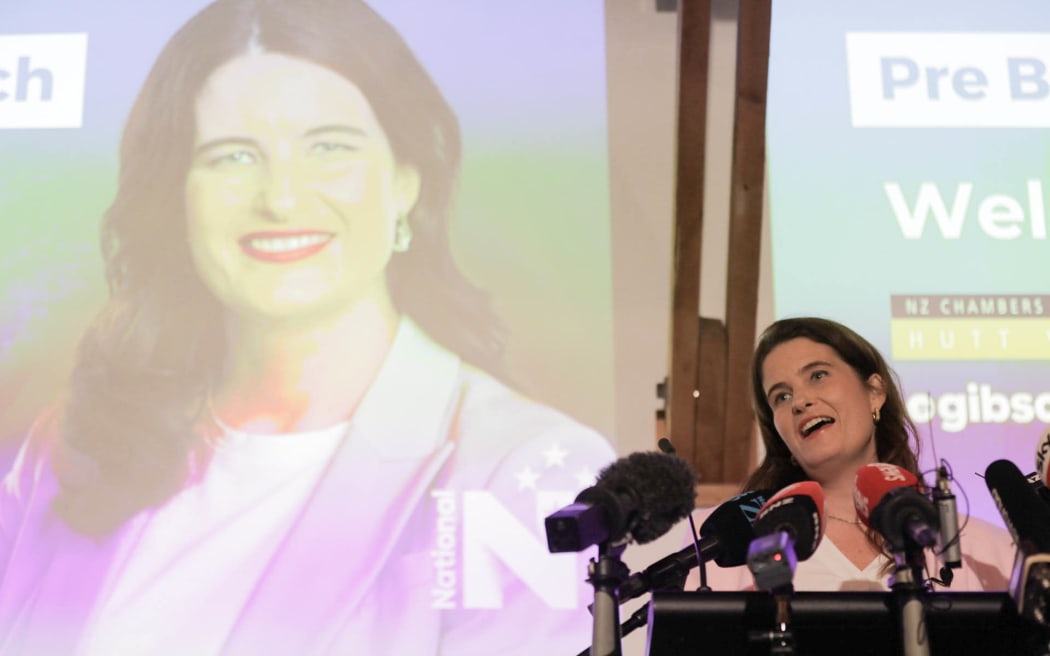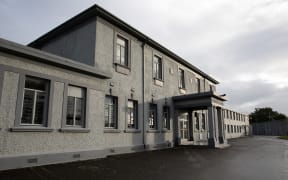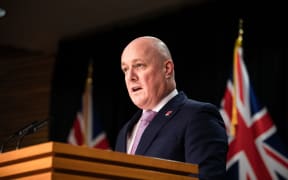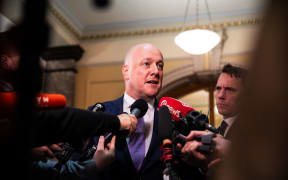
Finance Minister Nicola Willis makes a pre-Budget speech to the Hutt Chamber of Commerce. Photo: RNZ/Samuel Rillstone
Finance Minister Nicola Willis has done a conservative lift of the lid on her 30 May Budget at a speech to the Hutt Chamber of Commerce on Thursday, giving a glimpse of what to expect.
It comes after the Coalition has already rolled out three pre-Budget announcements and has another scheduled for Friday.
On Monday, the prime minister and corrections minister announced a $1.9 billion investment in more beds at Waikeria Prison, better pay and more Corrections staff recruits and rehabilitation for remand prisoners, and on Wednesday David Seymour announced $478m in time-limited funding for free lunches in schools.
The week before more than $60m was announced by Education Minister Erica Stanford for mandatory structured literacy in schools.
With a full belly following a pre-Budget breakfast, business leaders sat back and listened to Nicola Willis promising not to deliver an austerity Budget but sending plenty of doom and gloom warnings about the country's economic challenges and "darkest before the dawn" financial position.
Here's what Willis laid out exactly three weeks ahead of her big Budget reveal.
Tax cuts for almost all
Willis isn't giving up on her tax relief centrepiece and told those gathered in Silverstream on Thursday morning that she knew how "devastating it would be if we were to give up on overdue tax relief".
The finance minister has confirmed her tax cut package will increase the take-home income of 83 percent of New Zealanders over the age of 15, and 94 percent of households.
"We will responsibly deliver these lower taxes for low and middle-income families, by fully funding them with a package of careful savings and targeted revenue measures," she said.
Those missing out on tax relief are the 17 percent of Kiwis who receive a benefit or don't pay income tax.
There will also be changes to the current income tax thresholds.
As for whether those tax cuts will end up being inflationary, something economic commentators have long criticised, Willis says she's received new modelling from Treasury that backs her belief it will be "fiscally neutral tax relief".
How much money there is to play with
Nicola Willis has committed to running her Budget on an operating allowance of less than $3.5 billion.
"That's less than the previous government's allowance and it will be adhered to - a first in recent years. That has been possible because of our government's willingness to redirect existing spending to a better purpose," she said.
In order to pay for those tax cuts Willis says reprioritisations have been managed, targeted revenue measures have been found and as for the $1.5b in savings the Government needed to secure, Willis said, "I am confirming today that we have met that savings target".
The ministries safest from the back-office cull
While all government ministries and agencies were told to go away and find between 6.5 and 7.5 percent in back-office savings, some have over-delivered and some have fallen short.
Both Police and the Ministry for Disabled People, Whaikaha, didn't reach the target.
Willis said in the case of Police it was "for good reasons".
"They were able to convince us that reaching their target would involve potentially making changes that would undermine their frontline service provision," Willis said.
As a result they were told they were safe from the cost-cutting, along with a few other agencies.
Whaikaha made some savings around consultant and contractor spending and back-office efficiencies, but not the full contribution.
There has been speculation as to whether Foreign Affairs Minister Winston Peters escaped the savings target with his ministry, but on Thursday Willis confirmed MFAT had met the savings asked of it.
Putting social back into investment
Willis is changing up the Social Wellbeing Agency, as it was called by Labour, and giving it back the name of Social Investment Agency, which was fist established in 2017 by the last National government.
It was the brainchild of former Prime Minister and Finance Minister Sir Bill English, and Willis reclaimed the Minister for Social Investment role when the coalition was formed in November.
The agency will be effective from 1 July but the Social Investment fund won't be set up until a later date.
The idea is that it will have commissioning powers and work with community, non-government organisations, and iwi providers to improve outcomes for some of the country's most vulnerable New Zealanders.
One thing Willis says she's confident it will achieve is reducing the number of Kiwis on a benefit.





